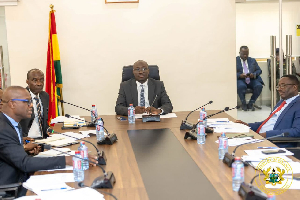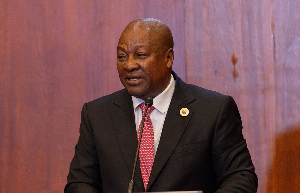Interviewer: As we approach Menstrual Hygiene Day, we are excited to speak with Emefa Kumaza, a dedicated advocate for girls' education and menstrual health in rural Ghana. Could you share a bit about your background?
Emefa Kumaza: Thank you for having me. I am an educator and program manager; and like you mentioned I am an advocate for education equity which encompasses issues that affect underserved students, like period poverty. I have been in this space since 2019 when I first moved to Tamale for my Lead for Ghana Teaching fellowship. It was there that I witnessed firsthand the challenges faced by many students in accessing quality education. This experience fueled my determination to address the disparities and ensure that all children, regardless of their background, have equal opportunities to learn and thrive. I recently earned my master’s degree in Education Policy and Management with the goal expanding access and the quality of education for children in marginalized communities.
Interviewer: Emefa, what initially drew you to this cause on period poverty?
Emefa Kumaza: Among the various issues I encountered, I was struck by the profound barriers that menstruation posed to girls' education. This experience motivated me to focus on providing the resources and support necessary for girls in underserved communities to manage their menstruation with dignity and without interruption to their education.
In rural Ghana, period poverty exacerbates the already existing barriers to girls' education. Many girls lack access to menstrual hygiene products, adequate sanitation facilities, and accurate information about menstruation. As a result, they often miss school during their periods, leading to academic setbacks and perpetuating the cycle of poverty. My work in this area focuses on providing girls with the resources and support they need to manage menstruation with dignity and continue their education uninterrupted.
Interviewer: How does improving menstrual hygiene impact the educational outcomes and daily engagement of girls in school?
Emefa Kumaza: Most people are not aware but Improving menstrual hygiene is crucial because it directly affects not just the attendance, but also the engagement and performance of girls in school. When girls are equipped to manage their menstruation safely and with confidence, it reduces the days they miss school, which are crucial for continuous learning and academic success. By attending school regularly, girls are able to participate fully in classroom activities, complete their assignments on time, and prepare adequately for exams.
This consistent engagement enhances their academic performance and opens up future career opportunities, laying a foundation for economic independence. Moreover, addressing menstrual hygiene helps to normalize menstruation and reduce the stigma, leading to a more inclusive and supportive educational environment for all students.
Interviewer: Can you describe the impact of your initiatives on the communities and the educational landscape for girls in the areas you serve?
Emefa Kumaza: I started the HER PERIOD MATTERS initiative in one school in 2021. We’ve managed to significantly improve school attendance and engagement among girls by providing over 3000 sanitary pads and setting up educational workshops. These efforts not only help with immediate needs but also empower girls with knowledge about their bodies, challenging taboos and enhancing their confidence. We currently have 5 schools in Tamale that we have worked with. We started with monthly distributions every month and then moved on to setting up pad banks in collaboration with school authorities who are committed to stocking up the pad bank.
Interviewer: With Menstrual Hygiene Day nearing, could you share some specific statistics that highlight the extent of period poverty and its impact?
Emefa Kumaza: Absolutely. UNESCO Studies indicate that 1 in 10 Sub-Saharan African girls miss school during their periods. The lack of proper sanitation facilities can lead to girls missing up to 50 school days a year, severely hampering their educational progress and future opportunities.
Interviewer: Reflecting on your time in this field, what have been some of the significant challenges you’ve encountered?
Emefa Kumaza: The journey has been both challenging and enlightening. We’ve faced deeply ingrained cultural stigmas around menstruation and raising of funds for the projects. Engaging with community leaders and families to build support was crucial but time-consuming.
Interviewer: What critical actions do you believe are necessary right now to combat period poverty?
Emefa Kumaza: The most urgent actions include abolishing all taxes on menstrual products and ensuring their free availability in schools. Last year the Finance Minister declared a zero rate VAT on locally manufactured sanitary pads and import duty waivers for raw materials for the local manufacture of sanitary pads. This is just the first step but we are calling for all taxes to be removed. Additionally, improving school infrastructure to include private and hygienic sanitation facilities is crucial.
These steps are fundamental to ensuring that menstruation no longer impedes education. Access to safe and private toilets is crucial for girls to manage their menstruation hygienically and with confidence. Without these facilities, the simple act of changing a sanitary pad becomes a challenge, contributing to higher absenteeism rates. It's essential that schools provide adequate toilets and clean water, which are basic needs for all students but especially critical for girls during their periods.
Interviewer: On a broader scale, how do these efforts fit into the goals of gender equality and public health?
Emefa Kumaza: Addressing menstrual hygiene is essential for advancing gender equality and public health. It supports girls' continued education, which is foundational to empowering women and breaking the cycle of poverty. Ensuring that girls can manage their menstruation safely and a biological feature like their periods does not affect their learning outcomes.
Interviewer: What message would you like to send to our readers as Menstrual Hygiene Day approaches?
Emefa Kumaza: This is a global issue affecting millions and everyone, from governments to individuals, has a role to play in prioritizing menstrual health. Your advocacy, donations, and volunteerism can drive significant change.
Interviewer: How can our readers contribute or get involved in supporting these initiatives?
Emefa Kumaza: We welcome support in various forms, be it through donations, volunteering, or advocacy for menstrual health policies. Everyone can contribute to driving policy change and ensuring these initiatives receive the necessary funding and attention.
Interviewer: Emefa, thank you for sharing your insights and for your tireless dedication to this cause. Your efforts are truly inspiring.
Emefa Kumaza was a full-time teacher in one of the underserved schools in Tamale, Ghana. During her time in the classroom and her placement community, she encountered numerous hurdles ranging from lack of resources to mindset challenges that affected the educational trajectory of her students and the community negatively.
This led to her spearheading numerous interventions and programs to mitigate the challenges. She co-founded Rural Empowerment through Education (REEd Africa) to continue her work in expanding educational opportunities and providing solutions that empower communities. Emefa has master’s degree in Education Policy and Management from Vanderbilt University
Opinions of Sunday, 26 May 2024
Columnist: Emefa Kumaza
Empowering girls in rural Ghana: A conversation on education and period poverty
Entertainment














